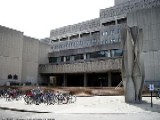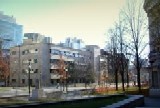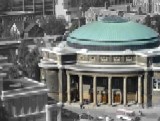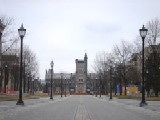|
Video
archive of the public talks
Sunday,
June 24, 2012 at 2:30 p.m.
L. Mahadevan (Harvard)
Motility: Molecules, Mechanics, Mathematics and Machines
Sunday,
June 24, 2012 at 4:00 p.m.
David
Earn (McMaster)
Puzzles in the Patterns of Plagues
Monday,
June 25, 2012 at 6:00 p.m.
Ron Dembo (Zerofootprint)
Using Mathematics to Combat Climate Change
Abstracts
L.
Mahadevan
de Valpine Professor of Applied Mathematics,Professor of Organismic
and Evolutionary Biology, Professor of Physics, Harvard University
Motility:
Molecules, Mechanics, Mathematics and Machines
Life is almost synonymous with autonomous motion, and the varied
solutions invented by nature to accomplish movement beg the question
of what general principles are used ? Using examples from the
dynamics of macromolecular spring and molecular motors in cells,
water driven movements in plants, and the muscle driven movements
in animals, I hope to show how understanding these special cases
allow us to sharpen the general question while providing lessons
for engineering biomimetic machines. I will close with a description
of some recent experimental and theoretical studies of the collective
dynamics of bristlebots; simple engineered robots that interact
only sterically.
David
Earn, McMaster University
Puzzles
in the Patterns of Plagues
Over the last century, there has been tremendous progress in understanding
the transmission of infectious diseases in human populations.
However, most historical outbreaks have not been studied in detail
because data that might permit such investigations are buried
in thousands of handwritten records. In recent years, my research
group has digitized a large number of these historical records
and begun to dissect the epidemic patterns. Modern computers allow
us to visualize these patterns, and mathematical methods are helping
us unravel the biological mechanisms that gave rise to the outbreaks.
I will discuss our ongoing work, focussing on outbreaks of plague,
from the Black Death in the 14th century to the Great Plague of
London in the 17th century.
Ron
Dembo, Zerofootprint
Using
Mathematics to Combat Climate Change
Climate change is probably the largest problem ever faced by mankind—we
have literally arrived at a point where we could feasibly destroy
our own habitat. So what role can mathematics play in helping
address this challenge? I believe that mathematics will play a
central role in the solutions that will help us adapt to the climate
change already occurring and prevent
runaway climate disaster. This talk touches on a few areas where
math is playing a central role today and addresses the roles it
might play. In some cases, as mathematicians, we will find ourselves
married with psychologists to solve behavioral problems. We will
be paired with farmers to solve agricultural problems. We will
be minimizing energy and carbon in our supply chains. We will
be building models for massive data analysis. We will be modeling
the planet, and so on.
|










